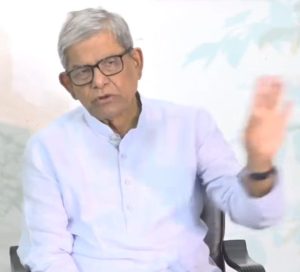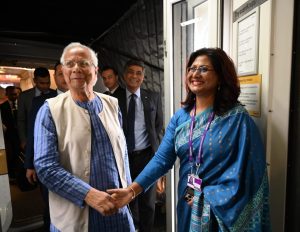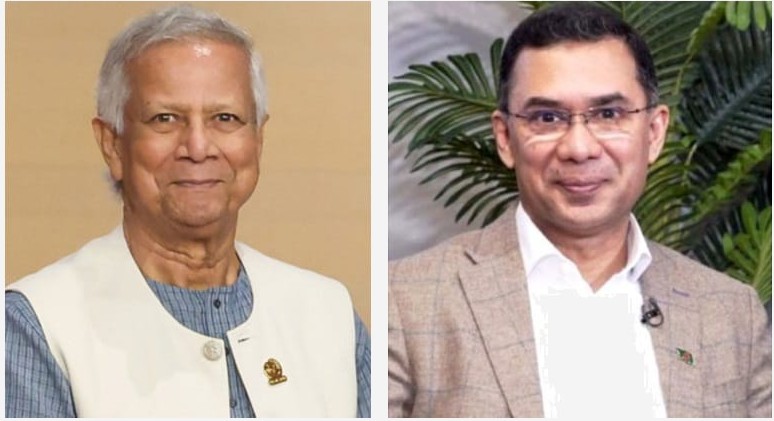All eyes are now on a meeting dubbed the most crucial for Bangladesh’s future political landscape, scheduled to take place in London between 9 and 11 a.m. on June 13.
The meeting between Chief Adviser Dr. Muhammad Yunus and BNP’s Acting Chairman Tarique Rahman has sparked renewed political speculation and cautious optimism within Bangladesh’s political arena.
The BNP views this dialogue as a potential turning point in ending the country’s ongoing political deadlock.
The party’s Secretary General, Mirza Fakhrul Islam Alamgir, termed the London meeting both timely and politically significant. He expressed hope that the meeting would help pave the way for resolving the ongoing political crisis.
Describing the Tarique-Yunus meeting as a potential turning point, Fakhrul said, “Tarique Rahman played a crucial role in the July mass uprising, from which the current government has emerged. If this meeting between the two parties succeeds, it could lead to simple solutions to complex problems.”

The timing of the announcement is critical, as uncertainty surrounds the election timeline and deep mistrust persists among major political parties.
The Chief Adviser, who had previously stated that the election would be held between December this year and June 2026, announced in a June 6 address to the nation that general elections will now take place in the first half of April next year. However, the timeline remains contested.
The BNP rejected the proposed schedule as impractical, arguing that launching election campaigns during Ramadan would be unfeasible. The monsoon season is also a concern.
Even while discussing the Yunus-Tarique meeting, Fakhrul remarked: “This (April) is not an ideal time for an election. Campaigning would coincide with Ramadan, and the heat would be intense. There’s a risk of campaign funds being exhausted on iftar events, with public gatherings pushed into late hours.”
Despite disagreements over the election timing, the meeting between Dr. Yunus and Tarique Rahman is being viewed as a potential breakthrough.
The BNP, both internally and publicly, reiterated the importance of the meeting, noting that it could open a new horizon for resolving the ongoing crisis.
Sources indicate that the discussion will likely focus on four major themes: revisiting the election timeline, ensuring participatory elections, initiating institutional reforms, and guaranteeing administrative neutrality.
Fakhrul, however, said that there is no pre-set agenda. “The discussions will be comprehensive and open-ended,” he said.
The possibility of restructuring the interim governance framework based on national consensus may also be on the table during the Yunus-Tarique meeting which also attracted international attention.
Dr. Yunus has recently held talks with several ambassadors to discuss the role of international observers in ensuring electoral transparency. At the same time, Tarique Rahman has been expanding the BNP’s diplomatic outreach.
The BNP Secretary General, too, emphasised that the meeting carries both national and international importance.
Some analysts view the meeting as a form of “backchannel consultation” or a precursor to an unofficial political understanding.

Observers suggest that if the meeting goes beyond mere courtesy and leads to substantive dialogue, it could bring about a major political breakthrough– particularly if agreements are reached on the election timeline, its structure, and inclusive participation. The outcome may not be immediate, but it could mark a crucial step toward breaking the deadlock.
However, much will depend on the substance of the talks and the political will to implement any agreements reached.
At this moment, the pressing question in Bangladesh’s political arena is: Will this meeting pave the way for a resolution? Can Tarique Rahman and Dr. Yunus lay the foundation for a new national consensus?
“Preserving national unity is now the most crucial task. Some claim that the BNP is against reform, but our Vision 2030 was the first major reform proposal. The BNP has always been at the forefront of advocating reform,” said Mirza Fakhrul.
He has a note of caution, urging everyone to act responsibly, speak thoughtfully, and work together to overcome misunderstandings.


